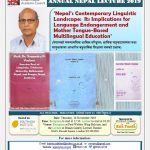Publications Britain - Nepal Academic Council
 Britain-Nepal Academic Council
Britain-Nepal Academic Council
The Britain-Nepal Academic Council was established on 23 May 2000 at a large meeting at the School of Oriental and African Studies in London of British academics and researchers interested in various aspects of...
Read More-
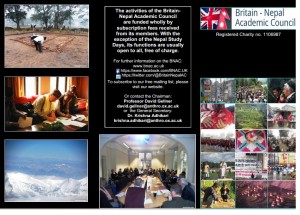 BNAC Brochure 2019
BNAC Brochure 2019
Download PDF.
Download -
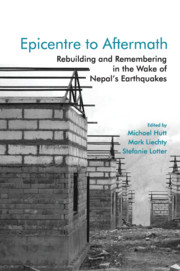 Epicentre to Aftermath Rebuilding and Remembering in the Wake of Nepal’s Earthquakes (2021)
Epicentre to Aftermath Rebuilding and Remembering in the Wake of Nepal’s Earthquakes (2021)
Author: Michael Hutt, Mark Liechty, & Stefanie Lotter (Eds.)
Publication Date: September 2021
Publisher: Cambridge University Press
Epicentre to Aftermath makes both empirical and conceptual contributions to the growing body of disaster studies literature by providing an analysis of a disaster aftermath that is steeped in the political and cultural complexities of its social and historical context. Drawing together scholars from a range of disciplines, the book highlights the political, historical, cultural, artistic, emotional, temporal, embodied and material dynamics at play in the earthquake aftermath. Crucially, it shows that the experience and meaning of a disaster are not given or inevitable, but are the outcome of situated human agency. The book suggests a whole new epistemology of disaster consequences and their meanings, and dramatically expands the field of knowledge relevant to understanding disasters and their outcomes.Enhances approaches to disaster studies by offering a multidisciplinary regional perspective. Provides a multi-sited analysis of long term disaster impacts. Demonstrates the need for grounded and localised approaches to disaster studies that foreground the ‘endogenous response’
Download -
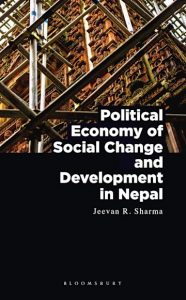 Political Economy of Social Change and Development in Nepal (2021)
Political Economy of Social Change and Development in Nepal (2021)
Author: Jeevan R. Sharma
Download
Publication Date: 30 Sep 2021
Publisher: Bloomsbury
Political Economy of Social Change and Development in Nepal is an accessible contemporary political economic analysis of social change in Nepal. It considers whether and how Nepal’s political economy might have been transformed since the 1950s while situating these changes in Nepal’s modern history and its location in the global economic system. It assembles and builds on the scholarship on Nepal from a multidisciplinary and synoptic perspective. Focusing on local
discourses, experiences and expectations of transformations, it draws our attention to how powerful historical processes are experienced and negotiated in Nepal and assess how these may, at the same time, produce ideas of equality, human rights and citizenship while also generating new forms of precarity. -
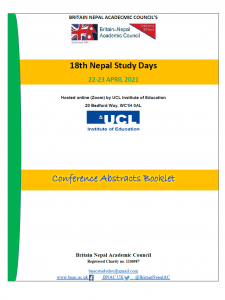 18th Nepal Study Days 22-23 Apr 2021 Conference Abstracts Booklet
18th Nepal Study Days 22-23 Apr 2021 Conference Abstracts Booklet
This booklets contains BNAC’s 18th Nepal Study Days (22-23 April 2021) conference programme and collection of abstracts. There is one keynote lecture, and over 40 papers to be presented in 12 panels, divided in two parallel sessions over two days.
Download -
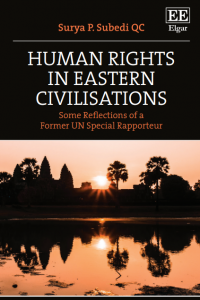 Human Rights in Eastern Civilisations: Some Reflections of a Former UN Special Rapporteur (2021)
Human Rights in Eastern Civilisations: Some Reflections of a Former UN Special Rapporteur (2021)
Author: Surya P. Subedi
Publication Date: March 2021 ISBN: 978 1 80088 361 1 Extent: 320 pp
Publisher: London: ElgarBased on the author’s first-hand experience as a UN Special Rapporteur, this thought-provoking and original book examines the values of Eastern civilisations and their contribution to the development of the UN Human Rights agenda. Rejecting the argument based on “Asian Values” that is often used to undermine the universality of human rights, the book argues that secularism, personal liberty and universalism are at the heart of both Hindu and Buddhist traditions.
Download -
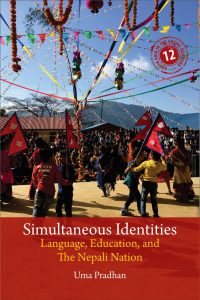 Simultaneous Identities: Language, Education, and the Nepali Nation (2020)
Simultaneous Identities: Language, Education, and the Nepali Nation (2020)
Author: Uma Pradhan (University of Oxford).
Pages:
Publisher: Cambridge University Press‘The recent socio-political changes in Nepal have brought assimilationist notions of Nepali nationalism under a tight scrutiny and drawn attention to more plural, inclusive, and diverse notions of Nepaliness. However, both assimilationist and pluralist visions continue to remain normative in their approach, and often posit ethnic and national identity in opposition to each other. Drawing on the everyday practices in the two schools, this book illustrates that social actors in minority language education did not necessarily select between minority identity and national identity, but instead made simultaneous claims to more than one social identity by discursively positioning ‘ethnic identity’ as ‘national identity’. It builds on the notion of ‘simultaneity’ to illustrate that it is through the ‘unresolved co-presences’ of apparently contradictory ways that people maintain their multi-layered identities. By arguing for an analytical necessity to adopt relational approach, it aims to complicate the neat compartmentalisation of identities.
Download -
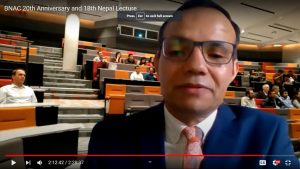 BNAC 20th Anniversary Celebration- Chairs Remarks Dr Krishna Adhikari 5-11-2020
BNAC 20th Anniversary Celebration- Chairs Remarks Dr Krishna Adhikari 5-11-2020
Power points slides presented along with the Chairs speech by Dr Krishna Adhikari during the 20th Anniversary of the Britain-Nepal Academic Council: 05-11-2020.
Download -
 BNAC 20th Anniversary-PPT Presenation Dr Krishna Adhikari 5-11-2020
BNAC 20th Anniversary-PPT Presenation Dr Krishna Adhikari 5-11-2020
Chair’s speech presented by Dr Krishna Adhikari to mark the 20th Anniversary of the Council. These slides present detailed information regarding the BNAC and past activities. They are to be read along with the remarks by the chair
Download -
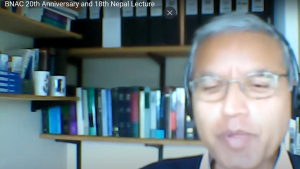 Prof. Surya Subedi- BNAC 20th Aniversary Speech 5 Nov 2020
Prof. Surya Subedi- BNAC 20th Aniversary Speech 5 Nov 2020
Speech by the BNAC founding Chair Surya Subedi on the 20th Anniversary of the Britain-Nepal Academic Council, on 05 November 2020.
Download -
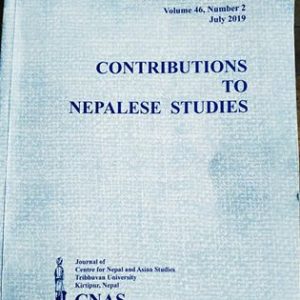 Contributions to Nepalese Studies- Nepal’s Dalits in Transition
Contributions to Nepalese Studies- Nepal’s Dalits in Transition
Contributions to Nepalese Studies. Volume 46, Number 2. July 2019.
Edited by: David N. Gellner and Krishna P. AdhikariContributors:
Download
Steve Folmar
Arjun Bahadur BK
Joanna Pfaff-Czarnecka
Tilak Biswakarma
Sambriddhi Kharel
Manoj Suji
Ramesh Sunam
Krishna Shrestha -
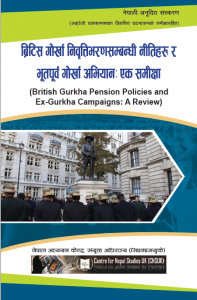 ब्रिटिस गोर्खा निवृत्तिभरणसम्बन्धी नीतिहरू र भूतपूर्व गोर्खा अभियान: एक समीक्षा (Nepali, 2019)
ब्रिटिस गोर्खा निवृत्तिभरणसम्बन्धी नीतिहरू र भूतपूर्व गोर्खा अभियान: एक समीक्षा (Nepali, 2019)
[British Gurkha Pension Policies and Ex-Gurkha Campaigns: A Review; Nepali trans., Updated 2019)
Download
Editor: Krishna P. Adhikari
Authors: Chandra Laksamba, Krishna P. Adhikari, Lokendra Purush Dhakal, David N. Gellner.
Year: 2019
Publisher: Centre for Nepal Studies UK (Reading) -
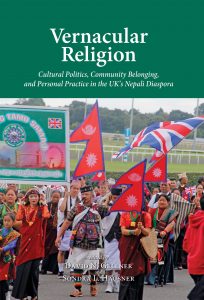 Vernacular Religion Cultural Politics, Community Belonging, and Personal Practice in the UK’s Nepali Diaspora (2019)
Vernacular Religion Cultural Politics, Community Belonging, and Personal Practice in the UK’s Nepali Diaspora (2019)
Editors: David N. Gellner and Sondra L. Hausner
Pages: 262+xviii
Publishers: Vajra Books, and Centre for Nepal Studies UK.Contributors: Krishna P. Adhikari, Florence Gurung, Chandra Laksamba, Mitra Pariyar, Bal G. Shrestha.
Nepalis in the UK are one of Britain’s newest ethnic minority communities. Already highly visible because of the Gurkha connection, in an extraordinarily short time they have made their mark on the British landscape and created 100s of community organizations.
How far does this impressive associational impulse simply re-create patterns found in Nepal and how far does it represent a series of new departures?
Does the new context in which Nepalis find themselves prevent them from following certain traditional practices (e.g. shamanism)? Does it also liberate them and enable other practices?
Do the social hierarchies and historical distinctions of Nepal still matter in the UK?
How much of a gap is there between public performance and private practice? And why is the gap bigger in some cases than in others?
Faced with the inescapable imperative to act ritually (after death, for example), how do UK-based Nepalis respond to these various dilemmas?
What debates are generated when UK Nepalis attempt to map the Enlightenment distinctions of culture, religion, and politics on to inherited Nepali practices? Does the characteristic Nepali (and indeed Asian) polytropic approach to religion have something to teach us about how religion should be approached in general?These essays—all products of the Vernacular Religion project (2009–12), part of the AHRC’s Religion and Society programme—attempt to address these questions on the basis of detailed field research. They seek to provide an introduction to the full range of religious arguments and experiences of the UK’s diverse Nepali population.
Download -
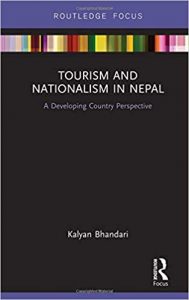 Tourism and Nationalism in Nepal: A Developing Country Perspective (2018)
Tourism and Nationalism in Nepal: A Developing Country Perspective (2018)
Author: Kalyan Bhandari
Download
102 pages | 2 B/W Illus.
2018
This book explores the role of tourism in the expression of nationalism in Nepal. It investigates assemblage of images, emblems, and symbols of Nepali nationhood in various touristic representations and narratives from Nepali travellers and diasporic visitors to showcase how they express nationhood and stimulate a strong sentiment of national feeling and belonging. The book suggests that touristic settings in Nepal provide a venue for articulation of nation, first through internal ascription, that is, the construction of identity by citizens with the nation; and second, through the promotion of distinctive touristic identity through the assertion of national uniqueness and distinguishing the nation within the larger international community.
Given the recent great political changes, post-conflict nation rebuilding, and development, Nepal offers a fascinating case study on the role of tourism and nationalism. This book will be of great interest to students, scholars, and professionals working in tourism and heritage studies, sociology, anthropology, geography, political science, and area studies, as well as those interested in the study of developing societies. -
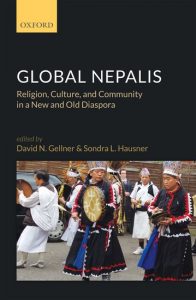 Global Nepalis : Religion, Culture, and Community in a New and Old Diaspora
Global Nepalis : Religion, Culture, and Community in a New and Old Diaspora
Edited by David N. Gellner and Edited by Sondra L. Hausner
540 Pages | Various, 10 Figures, 9 Tables
Contributors: Krishna P. Adhikari, Radha Adhikari, Tristan Bruslé, Sienna R. Craig, Florence Gurung, Nawang Tsering Gurung, Susan Hangen, Sushma Joshi, Chandra K. Laksamba, Kelvin E.Y. Low, Kathryn March, Mitra Pariyar, Anil Sakya, Bhimsen Sapkota, Jeevan Raj Sharma, Bal Gopal Shrestha, Bandita Sijapati, Anna Stirr, Mélanie VandenhelskenMigration has always been a feature of Nepali society. Waves of Khas, Brahmans, and associated service castes were already moving south and east through the Himalayan foothills a millennium ago. As the population expanded, Nepalis from all backgrounds have continually moved onwards in search of new farmland and new opportunities, often encouraged to do so by local communities, local headmen, and the state. In the late nineteenth and twentieth centuries, that process continued eastwards from present-day Nepal into the north-east of India and beyond. Over the last thirty years international labour migration, as well as migration consequent on tertiary education, has radically changed the patterns of settlement of Nepalis outside their homeland. The present volume covers the many different contexts-from the USA to the Gulf, from India to Burma and Singapore-where large numbers of Nepalis are settled or working long-term. Taken together, and organized by region of settlement, the contributions in this book provide a comprehensive overview of Nepali diaspora populations around the world in their contemporary contexts. The common theme binding this volume is the exploration of the process of ‘ethnogenesis’ or the emergence of strong ethnic identities in which the contributors analyse how such identities strengthen more easily in the diaspora with a large population, than in the homeland.
Download -
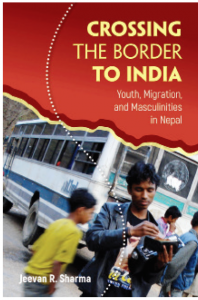 Crossing the Border to India: Youth, Migration, and Masculinities in Nepal
Crossing the Border to India: Youth, Migration, and Masculinities in Nepal
Author: Jeevan R. Sharma
Download
192 pp
temple.edu
“Sharma’s Crossing the Border to India is a sensitive ethnography that conveys what it is like to be a Nepali migrant in India. Especially valuable is the fact that gender (masculinity) and the life course are central to this cultural account of a phenomenon that has hitherto been dominated by quantitative analyses. The vignettes are excellent and the characters are recognizable throughout the book.”
—David N. Gellner, Professor of Anthropology, University of Oxford, author of The Anthropology of Buddhism and Hinduism: Weberian Themes, and editor of Borderland Lives in Northern South Asia

